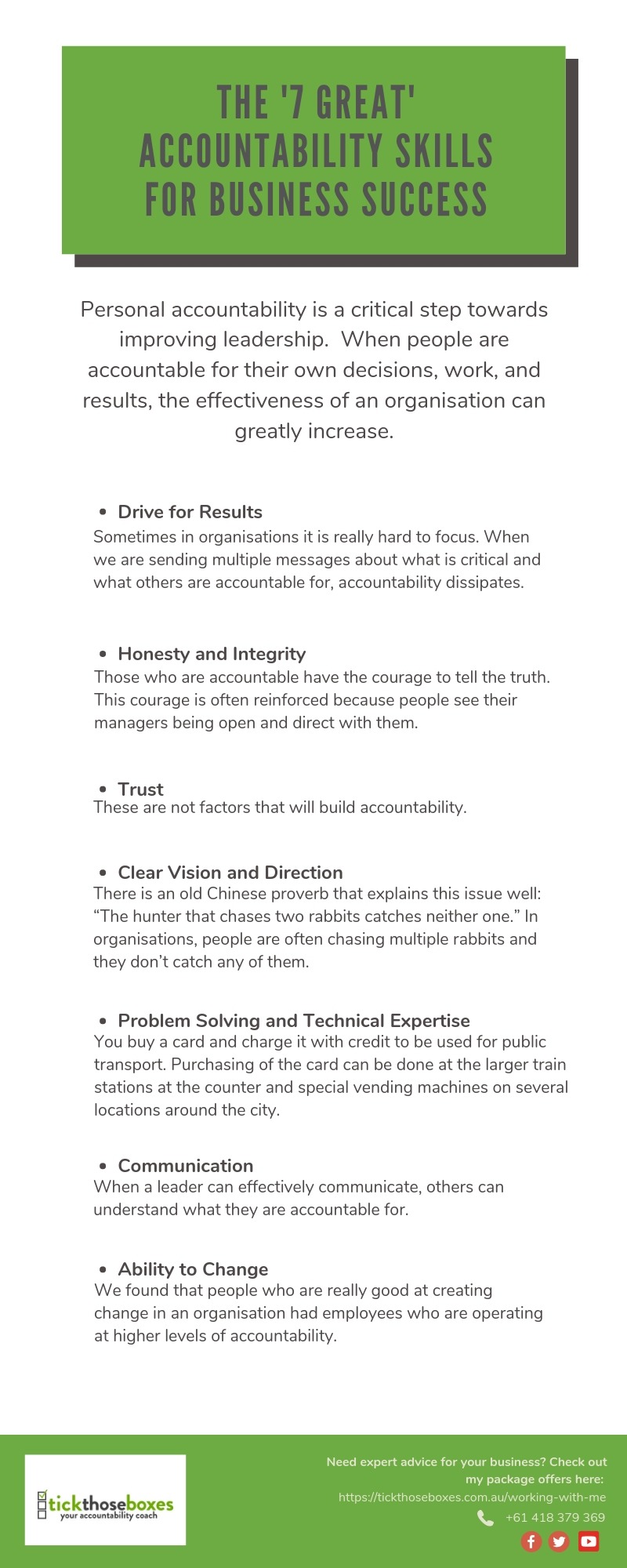
Posted on: 06/08/2024

Personal accountability plays a crucial role in driving business success. In many organizations, seasoned workers have observed instances of finger-pointing and dishonesty. However, fostering personal accountability is essential for enhancing leadership and organizational effectiveness.

Discover your Accountability Score and increase the probability of smashing your GOALS and Getting Sh!t Done!
When individuals take responsibility for their decisions, work, and outcomes, the overall performance of the organization improves. One major challenge in accountability lies in the degree of control employees have over their work. High levels of accountability are observed when employees control the what, when, and how of their tasks. Conversely, accountability diminishes when others dictate the methods of work. Research on control and influence in various organizational structures—autocratic, democratic, and laissez-faire—reveals that the most effective organizations empower their teams, ensuring everyone feels their voice is heard. This sense of influence leads to greater investment in their work.
Another significant factor is leadership behavior. Effective leadership can foster a stronger sense of accountability among team members. Contrary to popular belief, simply demanding accountability, delegating decision-making, or giving motivational speeches are not the most effective methods. Analyzing 360-degree assessments of 40,000 leaders, we identified behaviors exhibited by those in the 90th percentile of accountability. These behaviors are key to cultivating high personal accountability within teams.
When I looked at these exceptional leaders’ behaviours I found eight that were linked to high personal accountability. They are as follows:
Sometimes in organisations, it is really hard to focus. When we are sending multiple messages about what is critical and what others are accountable for, accountability dissipates. If you want people to be responsible, then you must clearly define the results that you want them to deliver, and let them have a fair amount of control on how they deliver those results.
When your boss asks in a company meeting, “how’s that project coming?” do you honestly reply, “we are really behind” or “pretty good?” Those who are accountable have the courage, to tell the truth. This courage is often reinforced because people see their managers being open and direct with them.
Back in 2014, Joe Falkman (writer for Forbes) undertook some research on a set of leaders who were not trusted and found their employees had the following issues:
These are not factors that will build accountability. In contrast, the three pillars that build trust are positive relationships, knowledge, and consistency of leaders.
There is an old Chinese proverb that explains this issue well: “The hunter that chases two rabbits catches neither one.” In organisations, people are often chasing multiple rabbits and they don’t catch any of them. How can you expect people to be accountable if they aren’t absolutely clear about the organisation’s vision for where they’re going and what needs to be accomplished? Clearly, you can’t.
It is impossible to feel accountable when a person is confused and doesn’t know how things work. Teach your people the skills and give them the training they need, and make absolutely sure they know how to do the job you expect.
When a leader can effectively communicate, others can understand what they are accountable for. This requires being able to tell, ask, and listen to others.
We found that people who are really good at creating change in an organisation had employees who are operating at higher levels of accountability. Leaders who are good at instituting change are effective at the following behaviours: accepting feedback, taking on challenges, innovating, spreading optimism, showing concern, and setting clear goals.
On the long personal and organisational “to-do” list, accountability should be at the top of the list. If you see a fatal flaw in yourself or your current leaders on any of these seven points, you should address it immediately.
In fact, the single greatest way to leverage accountability is to pick a few of these key behaviours to work on yourself. Why? The research is clear on this issue: great accountability in the organisation begins with you.

If you need help with your business, I work with entrepreneurial business owners, executives and their teams to ensure full accountability so they can meet obligations, promises and commitments made to others and themselves.
Book a Call or take a look at my Accountability Coaching Packages
I was excited to join Tia Harmer on The Work in Progress: The Personal Productivity Science Insights Podcast! We dive deep into the science of goal setting and the power of accountability—two cornerstones of business and personal success.